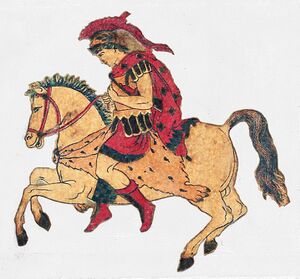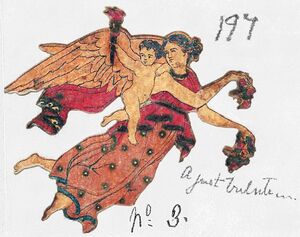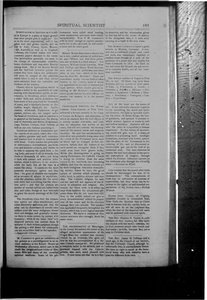HPB-SB-1-203: Difference between revisions
No edit summary |
No edit summary |
||
| (4 intermediate revisions by 2 users not shown) | |||
| Line 4: | Line 4: | ||
| image = SB-01-203.jpg | | image = SB-01-203.jpg | ||
| notes = | | notes = | ||
}} | }} | ||
[[File:SB-01-203.1.jpg|200px|thumb|right|SB, v. 1, p. 203, fragment back]] | |||
{{Style S-HPB SB. HPB note| № (2) |center}} | {{Style S-HPB SB. HPB note| № (2) |center}} | ||
{{Style P-HPB SB. Title continued|Spiritus Mundi and Its Operations in Nature. No.1|1- | {{Style P-HPB SB. Title continued|Spiritus Mundi and Its Operations in Nature. No.1|1-202}} | ||
... | ... | ||
... the date of my birth {{Style S-HPB SB. HPB note|(turn over № 1)}} | ... the date of my birth | ||
{{Style S-HPB SB. HPB note|(turn over № 1)|center}} | |||
{{Style S-HPB SB. HPB note|№ 4. |center}} | {{Style S-HPB SB. HPB note|№ 4. |center}} | ||
... | ... | ||
{{ | {{HPB-SB-item | ||
| volume = 1 | |||
| page = 203 | |||
| item = 1 | |||
| type = image | |||
| file = SB-01-203-1.jpg | |||
| image size = 300px | |||
| status = improved | |||
| author = | |||
| title = | |||
| notes = Warrior on a horse | |||
| categories = cartoons | |||
| hide = yes | |||
}} | |||
{{ | {{HPB-SB-item | ||
{{Style S-HPB SB. HPB note|A just tributing |center}} | | volume = 1 | ||
| page = 203 | |||
| item = 2 | |||
| type = image | |||
| file = SB-01-203-2.jpg | |||
| image size = 300px | |||
| status = improved | |||
| author = | |||
| title = | |||
| notes = Woman with a child (or an angel) | |||
| categories = cartoons | |||
| hide = yes | |||
}} | |||
{{Style S-HPB SB. HPB note|A just {{Style S-Lost|tributing}} |center}} | |||
{{Style S-HPB SB. HPB note|№ 3. |center}} | {{Style S-HPB SB. HPB note|№ 3. |center}} | ||
... | ... | ||
{{Style P-HPB SB. Article separator}} | |||
{{Style S-HPB SB. HPB note|Nov<sup>{{Style S-Double underline|ber}}</sup> 30. 1876 |center}} | {{Style S-HPB SB. HPB note|Nov<sup>{{Style S-Double underline|ber}}</sup> 30. 1876 |center}} | ||
{{ | {{HPB-SB-item | ||
... | | volume = 1 | ||
| page = 203 | |||
| item = 3 | |||
| type = article | |||
| status = proofread | |||
| continues = | |||
| author signed = Somerville Citizen | |||
| title = Spiritualism or Spiritism | |||
| subtitle = | |||
| untitled = yes | |||
| source title = Spiritual Scientist | |||
| source details = v. 5, No. 15, December 14, 1876, p. 161 | |||
| publication date = 1876-12-14 | |||
| original date = | |||
| notes = | |||
| categories = | |||
}} | |||
{{Style S-Small capitals|Spiritualism}} or Spiritism as it is called in Europe is a plant of larger growth than most people give it credit for. Even in the most unpromising soil it has taken root and grown rapidly, and we had in Italy, France, Spain, Mexico, Chili, Australia as well as in England, (Germany, the United States and other countries, papers devoted to the cause. The Spiritualists generally are open to the charge of unreasonable credulity, hence charlatans and imposters flourish among them. But if the Boston Herald and the Spiritual Scientist pursue the course they have taken, the philosophy will soon be purged of the parasites which infest it, and it will then attract more attention from the scientists and thinkers of the country. | |||
Closely akin to Spiritualism, which is simply a belief in the possibility of communing with disembodied spirits, or necromancy, is Occultism, which embraces a wider field, and which, doubtless, has been more or less practised for thousands of years, and is familiarly known as divination, magic, black-art, etc. Spells, charms, witchcraft, Vaudooism, magic glasses, mirrors, etc., are ranged under the head of Occultism, and its practice is as general as the human race, the aborigines of Australia and Africa, Esquimaux, Laps, Tartars, Chinese, East Indians as well as our own Indians practising it. | |||
Occultism believes in elementary spirits—spirits of air, earth water, fire, —fairies, sprites, gnomes and such creatures, and teaches how to attain to communion with them. It also teaches the principles of clairvoyance, clairaudience, psychometry and kindred subjects, and claims to be able to separate the spirit from a living body, and send it off on errands, hundreds or thousands of miles and bring it back with correct and positive information, which it delivers to its senders- while the body lies all the time in a trance like sleep. It summons the most powerful elementary spirits and they obey; the genii of Aladdin are reproduced as servants of adepts in mysticism; even the planetary spirits (for the occultists claim that everything has life, therefore spirit — and that the planets are abodes of myriad spirits) are called from afar, and come, though at rare intervals) to grace the mystic meetings of the Cabala. | |||
The Occultists claim that the elementary spirits are often mischievous, and some absolutely malicious, but that the adep can by observance of certain rules subject even the most malignant, thwart their evil designs, and gradually human ire them to some extent, by contact with humanity; while at the same time evil- disposed persons can control them lo minister to their vicious purposes, though like petting a wild beast, the consequences are sometimes fatal to the operator. ''—Somervill Citizen.'' | |||
{{HPB-SB-footer-footnotes}} | |||
{{HPB-SB-footer-sources}} | |||
<gallery widths=300px heights=300px> | |||
spiritual_scientist_v.05_n.15_1876-12-14.pdf|page=5|Spiritual Scientist, v. 5, No. 15, December 14, 1876, p. 161 | |||
</gallery> | |||
Latest revision as of 21:01, 2 May 2023

< Spiritus Mundi and Its Operations in Nature. No.1 (continued from page 1-202) >
...
... the date of my birth
...


...
<Untitled> (Spiritualism or Spiritism)
Spiritualism or Spiritism as it is called in Europe is a plant of larger growth than most people give it credit for. Even in the most unpromising soil it has taken root and grown rapidly, and we had in Italy, France, Spain, Mexico, Chili, Australia as well as in England, (Germany, the United States and other countries, papers devoted to the cause. The Spiritualists generally are open to the charge of unreasonable credulity, hence charlatans and imposters flourish among them. But if the Boston Herald and the Spiritual Scientist pursue the course they have taken, the philosophy will soon be purged of the parasites which infest it, and it will then attract more attention from the scientists and thinkers of the country.
Closely akin to Spiritualism, which is simply a belief in the possibility of communing with disembodied spirits, or necromancy, is Occultism, which embraces a wider field, and which, doubtless, has been more or less practised for thousands of years, and is familiarly known as divination, magic, black-art, etc. Spells, charms, witchcraft, Vaudooism, magic glasses, mirrors, etc., are ranged under the head of Occultism, and its practice is as general as the human race, the aborigines of Australia and Africa, Esquimaux, Laps, Tartars, Chinese, East Indians as well as our own Indians practising it.
Occultism believes in elementary spirits—spirits of air, earth water, fire, —fairies, sprites, gnomes and such creatures, and teaches how to attain to communion with them. It also teaches the principles of clairvoyance, clairaudience, psychometry and kindred subjects, and claims to be able to separate the spirit from a living body, and send it off on errands, hundreds or thousands of miles and bring it back with correct and positive information, which it delivers to its senders- while the body lies all the time in a trance like sleep. It summons the most powerful elementary spirits and they obey; the genii of Aladdin are reproduced as servants of adepts in mysticism; even the planetary spirits (for the occultists claim that everything has life, therefore spirit — and that the planets are abodes of myriad spirits) are called from afar, and come, though at rare intervals) to grace the mystic meetings of the Cabala.
The Occultists claim that the elementary spirits are often mischievous, and some absolutely malicious, but that the adep can by observance of certain rules subject even the most malignant, thwart their evil designs, and gradually human ire them to some extent, by contact with humanity; while at the same time evil- disposed persons can control them lo minister to their vicious purposes, though like petting a wild beast, the consequences are sometimes fatal to the operator. —Somervill Citizen.
Editor's notes
Sources
-
Spiritual Scientist, v. 5, No. 15, December 14, 1876, p. 161


